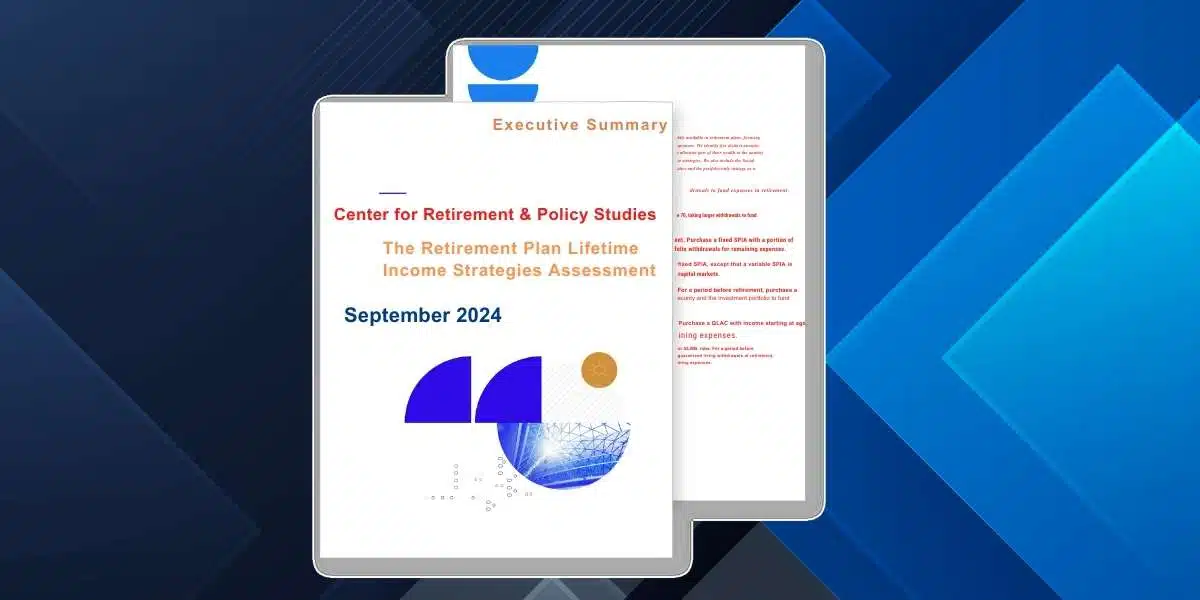A lifetime income strategy ensures financial stability and peace of mind during retirement. It safeguards against outliving your savings.
A well-planned retirement strategy is vital for a secure future. Many retirees face the risk of outliving their savings. This can lead to financial stress and uncertainty. By adopting a lifetime income strategy, you create a steady stream of income that lasts throughout your retirement years.
This approach helps cover essential expenses and allows you to maintain your desired lifestyle. Planning early and considering various income sources, such as pensions, annuities, and investments, can make a significant difference. Securing a reliable income stream gives retirees confidence and freedom to enjoy their golden years without financial worries.

Importance Of Lifetime Income
A lifetime income strategy is vital for a secure retirement. It ensures you have money throughout your retirement. This strategy helps in maintaining financial stability. Let’s explore why lifetime income is crucial.
Financial Security
Having a lifetime income provides financial security. You won’t worry about running out of money. Regular income helps cover daily expenses and unexpected costs. It also allows for better budgeting and planning. This stability is essential for a worry-free retirement.
Stress Reduction
Reducing stress is another benefit of a lifetime income strategy. Knowing you have a steady income helps you relax. You can enjoy retirement without financial worries. This peace of mind improves overall well-being and health.

Challenges In Retirement Planning
Planning for retirement is a crucial task. It involves many challenges that can impact financial stability. These challenges can make it hard for retirees to enjoy their golden years. Understanding these challenges can help in creating a robust retirement plan.
Longevity Risk
Longevity risk refers to the possibility of outliving your savings. People are living longer due to advances in healthcare. This means they need more money to support themselves for a longer period. Running out of money in old age is a real fear for many.
To manage longevity risk, consider these strategies:
- Invest in annuities
- Maintain a diversified portfolio
- Plan for healthcare costs
Inflation Impact
Inflation reduces the purchasing power of money over time. Even a small inflation rate can erode savings significantly. For example, a 3% inflation rate can halve the value of money in about 24 years.
To protect against inflation, consider these options:
- Invest in stocks and real estate
- Use inflation-protected securities
- Regularly review and adjust your portfolio
By addressing these challenges, a lifetime income strategy becomes essential. It ensures a stable and secure financial future during retirement.
Types Of Lifetime Income Strategies
As you plan for retirement, securing a stable income is crucial. There are various lifetime income strategies to ensure your financial future. Let’s explore two key options: annuities and pension plans.
Annuities
Annuities are contracts with insurance companies. You pay a lump sum or series of payments. In return, the company provides regular income. Annuities can be immediate or deferred.
Immediate annuities start paying you right away. They are ideal if you need income now. Deferred annuities begin payments at a future date. This allows your money to grow tax-deferred.
There are different types of annuities:
- Fixed annuities: Provide a guaranteed income.
- Variable annuities: Payments vary based on investment performance.
- Indexed annuities: Earnings are linked to a market index.
Annuities offer stability and can be tailored to your needs. They protect you from outliving your savings.
Pension Plans
Pension plans are employer-sponsored retirement plans. They provide a monthly income after retirement. These plans are either defined benefit or defined contribution.
Defined benefit plans promise a specific monthly amount. This is based on salary and years of service.
Defined contribution plans depend on contributions and investment returns. Examples include 401(k) and 403(b) plans.
A table can help compare these types:
| Plan Type | Features |
|---|---|
| Defined Benefit | Guaranteed monthly income, employer-funded, based on salary and tenure. |
| Defined Contribution | Income depends on contributions and investment returns, often employee and employer-funded. |
Pension plans offer predictable income for a secure retirement. They provide financial peace of mind.
Benefits Of Guaranteed Income
Planning for retirement requires careful consideration of many factors. One crucial aspect is ensuring a steady income stream. Guaranteed income provides retirees with peace of mind and financial security. Below, we explore the key benefits of guaranteed income in retirement.
Predictable Cash Flow
Guaranteed income offers a predictable cash flow. This means retirees receive a fixed amount of money regularly. It helps in managing daily expenses and budgeting effectively. Knowing the exact amount you’ll receive each month removes financial stress.
| Monthly Expenses | Amount |
|---|---|
| Housing | $1,000 |
| Groceries | $300 |
| Utilities | $200 |
| Healthcare | $150 |
Having a guaranteed income helps cover these expenses without worry. Fixed income streams eliminate uncertainties around monthly budgets. Retirees can plan their finances better.
Protection Against Market Volatility
Market volatility can affect retirement savings significantly. Guaranteed income protects retirees from these fluctuations. Investments in stocks or mutual funds can be risky. Their values can change based on market conditions.
- Stock Market Crash
- Economic Recession
- Inflation Rates
With guaranteed income, retirees are shielded from these risks. Their income remains stable, regardless of market performance. This stability ensures a secure financial future.
In conclusion, a lifetime income strategy with guaranteed income provides predictability and protection. It ensures retirees enjoy a stress-free and financially secure retirement.
Balancing Growth And Security
Balancing growth and security is crucial for a successful retirement plan. A lifetime income strategy ensures that you have a steady income while also growing your wealth. This approach helps mitigate risks and provides financial peace of mind.
Investment Diversification
Investment diversification is key to balancing growth and security. Diversifying your investments means spreading them across various asset classes. This can include:
- Stocks
- Bonds
- Real estate
- Mutual funds
By diversifying, you reduce the risk of losing all your money. If one investment performs poorly, others may do well. This balance helps secure your retirement income .
Risk Management
Risk management is another essential part of a lifetime income strategy. It involves identifying and mitigating potential financial risks. Here are some common risk management techniques:
| Technique | Description |
|---|---|
| Asset Allocation | Distributing investments among different categories. |
| Regular Reviews | Assessing your portfolio’s performance periodically. |
| Insurance | Using insurance products to protect against losses. |
Effective risk management ensures that your investments are protected. This helps in maintaining a stable income during retirement.

Credit: fastercapital.com
Customizing Your Strategy
Creating a lifetime income strategy is essential for a comfortable retirement. Personalizing this plan ensures that it meets your unique needs. This approach provides flexibility and security for your future.
Individual Needs Assessment
Every person has different financial goals and challenges. Assessing your individual needs is the first step. Consider these factors:
- Current Savings: How much have you saved so far?
- Monthly Expenses: What are your regular monthly costs?
- Health Care Costs: Do you expect high medical expenses?
- Future Goals: Do you plan to travel or buy a new home?
Flexibility And Adjustments
A good retirement plan must be flexible. Life circumstances change, and your plan should too. Here are ways to keep your strategy adaptable:
- Regular Reviews: Check your plan annually to ensure it meets your needs.
- Adjust Contributions: Increase or decrease savings based on your current situation.
- Emergency Fund: Maintain a separate fund for unexpected expenses.
- Investment Diversification: Diversify investments to manage risk and increase returns.
Customizing your strategy allows you to stay in control. You can make adjustments as your life changes. This ensures a secure and comfortable retirement.
Common Mistakes To Avoid
Planning for retirement can be complex. Many people make mistakes that can impact their financial stability. Knowing these errors can help you plan better for a secure future.
Overestimating Returns
Many people expect high returns on their investments. This can lead to overconfidence and risky decisions. It’s important to be realistic about market performance. lifetime income strategy
Here’s a quick comparison to understand this better:
| Expected Return | Realistic Return |
|---|---|
| 10% | 5-7% |
Being overly optimistic can lead to disappointment. It’s better to aim for steady, moderate returns. This ensures a more stable income in retirement.
Underestimating Expenses
Many retirees don’t account for all their expenses. They forget about health care, inflation, and unexpected costs. This can lead to financial shortfalls.
- Health Care: Medical costs often rise with age.
- Inflation: The cost of living increases over time.
- Unexpected Costs: Emergencies can happen anytime.
Properly estimating expenses helps in maintaining a comfortable lifestyle. Creating a detailed budget can help in this regard.
Here’s a simple budget template to get you started:
Monthly Budget:
- Housing: $____
- Food: $____
- Healthcare: $____
- Transportation: $____
- Entertainment: $____
- Miscellaneous: $____
Reviewing your budget regularly ensures you stay on track. This can provide peace of mind throughout your retirement.
Steps To Implement A Lifetime Income Plan
Implementing a lifetime income plan ensures financial stability during retirement. It involves setting clear goals, consulting with financial advisors, and making informed decisions. Below are the steps to create a robust lifetime income strategy.
Setting Goals
Begin by defining your retirement goals. Know how much you will need monthly. Consider your lifestyle, health care, and any hobbies. A clear plan helps in setting realistic financial targets. Use the table below to list your expected expenses.
| Expense | Monthly Amount |
|---|---|
| Housing | $1,200 |
| Healthcare | $400 |
| Groceries | $300 |
| Leisure | $200 |
Summarize your total monthly expenses. This gives you a target income to aim for.
Consulting Financial Advisors
Seek advice from a trusted financial advisor. They can help tailor your plan. Advisors analyze your current savings and future income sources. They recommend the best investment strategies. Here are the steps to follow:
- Schedule an initial consultation.
- Provide detailed financial information.
- Discuss your retirement goals.
- Review their proposed plan.
Make sure to ask about fees and services. Understand what you are paying for and ensure it aligns with your goals.
Frequently Asked Questions
What Is The Importance Of Lifetime Income?
Lifetime income provides financial stability and peace of mind. It ensures consistent cash flow during retirement. This helps cover essential expenses and reduces financial stress.
What Is The Lifetime Income Strategy Income Benefit?
The lifetime income strategy income benefit provides guaranteed monthly payments for life, ensuring financial stability during retirement.
Why Is Retirement Income Planning Important?
Retirement income planning ensures financial security and stability. It helps manage expenses, healthcare costs, and lifestyle choices. Proper planning prevents outliving savings and provides peace of mind.
What Is The Lifetime Income In Retirement Plans?
Lifetime income in retirement plans ensures regular payments for life. It provides financial stability during retirement years.
Conclusion
A lifetime income strategy ensures financial stability during retirement. It helps manage expenses and provides peace of mind. Planning ahead reduces financial stress. Secure your future with a reliable income plan. Retirement should be enjoyed, not feared. Start planning today for a worry-free retirement.




